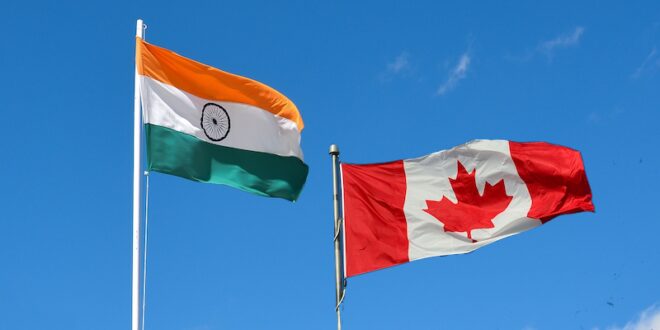When Canadian Prime Minister Justin Trudeau announced that his government had ‘credible allegations’ regarding India’s involvement in the murder of Hardeep Singh Nijjar, a Sikh separatist leader and Canadian citizen, he added to the spiralling doom loop that has been roiling India–Canada relations.
In the aftermath of the murder, which was caught on the security cameras of the gurdwara that Nijjar headed, Canadian authorities gathered human and signals intelligence pointing to the involvement of Indian officials, including communication intercepts of Indian diplomats in Canada. Some intelligence was shared with Canada by another member of the Five Eyes intelligence alliance, which includes Australia, Canada, New Zealand, the United Kingdom and the United States.
Given its shock at discovering that a supposedly friendly government had been involved in the murder of a Canadian citizen on Canadian soil — it was hardly surprising that Canadian officials raised the issue privately with the Indian government on several occasions during August and September. But as the story began circulating more widely in diplomatic and intelligence circles, and when details were then leaked by a national security source to the Globe and Mail, a Toronto newspaper, the Trudeau government decided to pre-emptively go public.
The same day, Canadian Minister of Foreign Affairs Mélanie Joly expelled an Indian diplomat, Pavan Kumar Rai, the station chief of the Research and Analysis Wing (RAW), India’s intelligence agency, who was based at India’s high commission in Ottawa. A Canadian trade mission due to visit India in October was also suspended.
The Indian government was unrepentant. It dismissed the Canadian claims as ‘absurd’ and, in a tit-for-tat move, expelled a Canadian diplomat from India. Two days later, India suspended all visa services in Canada, claiming that the security of its diplomatic missions in Canada had been compromised. On 3 October, the Indian government announced that 41 of the 62 Canadian diplomats in India had one week to leave the country.
There is now no easy way out of the doom loop for either country. For India, there is little incentive to back down given that any retreat would merely encourage the continuation of the diaspora politics in Canada that strained the relationship. Moreover, for the government of Indian Prime Minister Narendra Modi, there will be domestic benefits in treating Canada harshly, since many Indians are highly critical of the tolerance enjoyed by Sikh separatists in Canada.
For years, Indian governments have watched activists in Canada engaging in what New Delhi calls ‘anti-Indian activities’, including efforts to undermine Indian territorial integrity by working for the creation of an independent state, Khalistan, in Punjab. But these anti-Indian activities have also included threats against Indian diplomatic missions in Canada, the overt endorsement of violence as a political tool, and — in one particularly outrageous case — a very public display in Brampton, Ontario, that glorified the 1984 assassination of former Indian prime minister Indira Gandhi.
India often accuses Canada of being a safe haven for terrorists and gangsters, and has sought the extradition of several Canadians on terrorist and criminal charges. It claims that Canadian authorities have persistently refused to treat these charges seriously. In 2020, the Indian government declared Nijjar himself a ‘designated terrorist’, accusing him of leading a terrorist group, the Khalistan Tiger Force, and plotting terrorist attacks in India. A reward of one million rupees was offered for information leading to his arrest.
The Khalistan movement abroad is often framed by India as a national security threat and frequently linked to Pakistan’s Inter-Services Intelligence. Tellingly, after Trudeau’s announcement, stories began to appear in India claiming that the Inter-Services Intelligence organised Nijjar’s killing to discredit India.
Indians usually identify diaspora politics as the key reason for the lack of official Canadian action against the Khalistan movement in Canada. ‘Vote-bank politics’, it is claimed, prompts Canadian politicians to ignore the Khalistan movement’s negative impact on India in their hunt for votes among Canadians of Sikh origin.
That analysis is not wrong. Diaspora diplomacy is indeed deeply embedded in Canadian political practice. Sikhs are a prominent diaspora in Canada, with 770,000 citizens of Sikh origin — the largest Sikh population outside Punjab. Since Sikhs constitute 2.1 per cent of the Canadian population, politicians have long sought to play diaspora politics with this community, particularly since they are concentrated in a few constituencies in suburban Toronto and Vancouver.
But the importance of diaspora politics is why it will be so difficult for Canada to escape the doom loop. Canadian politicians are so used to seeking votes among Canada’s many diaspora groups, even though that pursuit is often conducted without any serious knowledge or understanding of its external effects. They are so wedded to diaspora politics that we are not likely to see movement any time soon to meet India’s concerns about the Khalistan movement in Canada — particularly not when citizens advocating peacefully for Khalistan are exercising their constitutionally protected rights.
Nor does the Canadian government have any incentive to back down given the seriousness of what it alleges the Indian government has done. The involvement of agents of a foreign and supposedly friendly government in the murder of a Canadian citizen on Canadian soil is such an egregious violation of national sovereignty and of contemporary norms of international relations that no government in Ottawa can ignore or overlook it.
The self-reinforcing downward spiral of the doom loop in India–Canada relations will continue to ensnare both countries — and will likely threaten to drag others in as well.
 Eurasia Press & News
Eurasia Press & News




